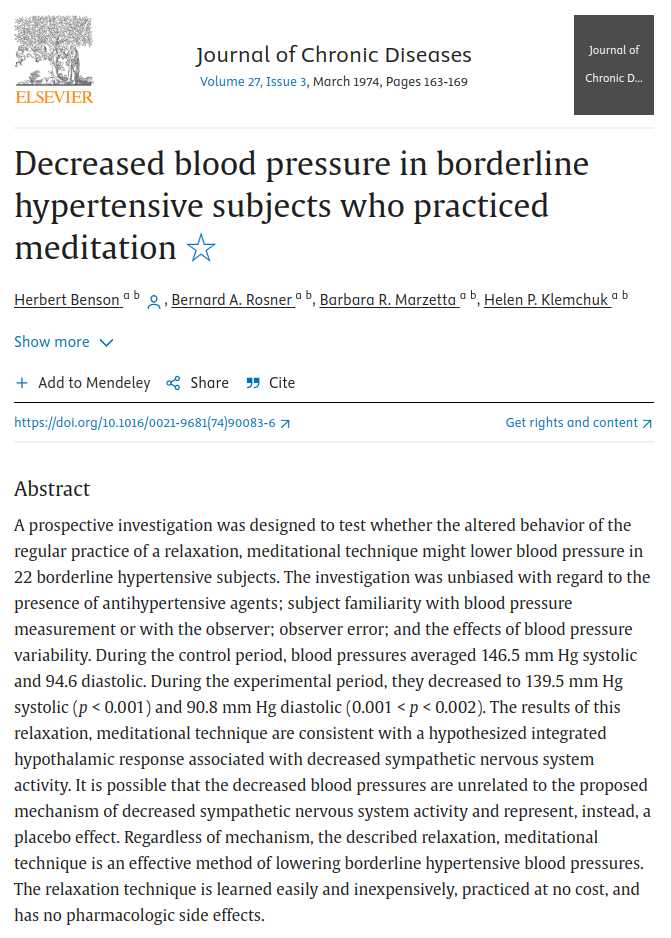Publication
Journal of Chronic Diseases
27(3):163-9
Abstract
A prospective investigation was designed to test whether the altered behavior of the regular practice of a relaxation, meditational technique might lower blood pressure in 22 borderline hypertensive subjects. The investigation was unbiased with regard to the presence of antihypertensive agents; subject familiarity with blood pressure measurement or with the observer; observer error; and the effects of blood pressure variability. During the control period, blood pressures averaged 146.5 mm Hg systolic and 94.6 diastolic. During the experimental period, they decreased to 139.5 mm Hg systolic (p < 0.001) and 90.8 mm Hg diastolic (0.001 < p < 0.002). The results of this relaxation, meditational technique are consistent with a hypothesized integrated hypothalamic response associated with decreased sympathetic nervous system activity. It is possible that the decreased blood pressures are unrelated to the proposed mechanism of decreased sympathetic nervous system activity and represent, instead, a placebo effect. Regardless of mechanism, the described relaxation, meditational technique is an effective method of lowering borderline hypertensive blood pressures. The relaxation technique is learned easily and inexpensively, practiced at no cost, and has no pharmacologic side effects.
Web and Email Links
Related Listings
Journal
Behavior Modification
Sleep latency changes following behavioral interventions for sleep-onset insomnia are only moderate because the majority of insomniacs do not achieve good sleeper status at posttreatment. This study evaluated the efficacy of a multifactor behavioral intervention consisting of stimulus control and relaxation-response training (n = 10) compared to stimulus control alone (n = 10) for sleep-onset insomnia. Only the multifactor subjects' mean posttest sleep latency fell within the good sle […]
Journal
International Journal of Cardiology
We report extremely prominent heart rate oscillations associated with slow breathing during specific traditional forms of Chinese Chi and Kundalini Yoga meditation techniques in healthy young adults. We applied both spectral analysis and a novel analytic technique based on the Hilbert transform to quantify these heart rate dynamics. The amplitude of these oscillations during meditation was significantly greater than in the pre-meditation control state and also in three non-meditation […]
Journal
Behavior Research and Therapy
The theoretical basis of systematic desensitization is reciprocal inhibition in which an alternative, competitive response to anxiety is conditioned to arousal-producing, phobic stimuli. Abbreviated training in progressive relaxation is believed to serve as a competitive response to anxiety by decreasing autonomic nervous system activity. However, physiologic studies of progressive relaxation have not substantiated that its practice is associated with such decreased autonomic activity […]

